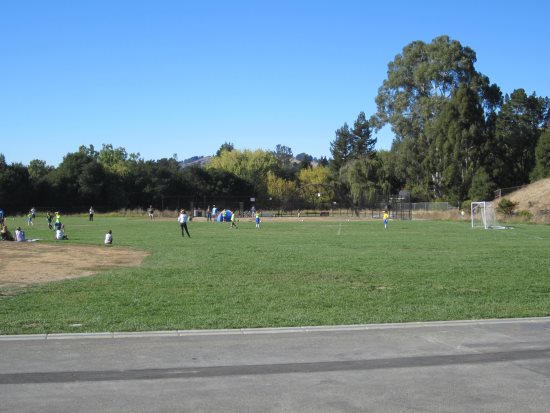 | | | Students play on the field at Camino Pablo Elementary School in Moraga Photo Vera Kochan | | | | | | As of July 11, there were 18,400 U.S. plaintiffs who had filed suit against the makers of Roundup and other weed killers alleging a link to their cancer diagnoses. Many of these weed killers contain a common ingredient - glyphosate.
 According to the Environmental Protection Agency website, glyphosate has been in use since 1974 and targets a broad range of weeds and grasses. The website claims "No risk to human health from current uses of glyphosate; no indication that children are more sensitive to glyphosate and; no evidence that glyphosate causes cancer."
According to the Environmental Protection Agency website, glyphosate has been in use since 1974 and targets a broad range of weeds and grasses. The website claims "No risk to human health from current uses of glyphosate; no indication that children are more sensitive to glyphosate and; no evidence that glyphosate causes cancer."
 However, in somewhat of a contradiction to its insistence that the product is safe the "EPA's draft ecological risk assessment found: potential risks to plants (aquatic and terrestrial); potential risks to birds from acute or short-term exposure and to mammals from chronic or long-term exposure; glyphosate is not expected to adversely impact aquatic animals but does have an effect on aquatic plants; and glyphosate is of low toxicity to honeybees."
However, in somewhat of a contradiction to its insistence that the product is safe the "EPA's draft ecological risk assessment found: potential risks to plants (aquatic and terrestrial); potential risks to birds from acute or short-term exposure and to mammals from chronic or long-term exposure; glyphosate is not expected to adversely impact aquatic animals but does have an effect on aquatic plants; and glyphosate is of low toxicity to honeybees."
 In an attempt to acknowledge "the potential risks to birds, mammals, and non-target terrestrial and aquatic plants from exposure to spray drift," the EPA is "proposing to require spray drift management labeling to reduce off-target spray drift and protect non-target plants and wildlife."
In an attempt to acknowledge "the potential risks to birds, mammals, and non-target terrestrial and aquatic plants from exposure to spray drift," the EPA is "proposing to require spray drift management labeling to reduce off-target spray drift and protect non-target plants and wildlife."
 Contra Costa County Climate Leaders co-director Sheila Hill credits Moraga School District Superintendent Bruce Burns for championing the fight to keep toxic chemicals out of Moraga's campuses.
Contra Costa County Climate Leaders co-director Sheila Hill credits Moraga School District Superintendent Bruce Burns for championing the fight to keep toxic chemicals out of Moraga's campuses.
 Burns stated, "An Integrated Pest Management board policy was in place before 2010 when I became superintendent."
Burns stated, "An Integrated Pest Management board policy was in place before 2010 when I became superintendent."
 The IPM governing board "recognizes that maintenance of a safe, clean, and healthy environment for students and staff is essential to learning. The board acknowledges that the use of toxic chemicals to control pests, including weeds, can pose significant risk to the environment and people, especially children. It is the goal of the Board to provide for the safest and lowest risk approach to control pest problems, including weeds, while protecting students, staff, and the environment, as well as district property." Included in the ban of toxic chemicals were those known to the state of California to cause cancer and birth defects.
The IPM governing board "recognizes that maintenance of a safe, clean, and healthy environment for students and staff is essential to learning. The board acknowledges that the use of toxic chemicals to control pests, including weeds, can pose significant risk to the environment and people, especially children. It is the goal of the Board to provide for the safest and lowest risk approach to control pest problems, including weeds, while protecting students, staff, and the environment, as well as district property." Included in the ban of toxic chemicals were those known to the state of California to cause cancer and birth defects.
 According to Parents for a Safer Environment, the state of California listed glyphosate as a known human cancer-causing chemical in July 2017. The theory of "Dose makes the Poison," due to the insistence of the EPA, was called into question when court documents revealed that "pesticide industry affiliated members sat in the U.S. EPA committee that addressed the toxicity of glyphosate."
According to Parents for a Safer Environment, the state of California listed glyphosate as a known human cancer-causing chemical in July 2017. The theory of "Dose makes the Poison," due to the insistence of the EPA, was called into question when court documents revealed that "pesticide industry affiliated members sat in the U.S. EPA committee that addressed the toxicity of glyphosate."
 In July, the East Bay Regional Park District board of directors voted unanimously to ban the use of glyphosates from all picnic areas and developed areas (lawns, sports fields, campgrounds, paved trails, parking lots and concession areas) by the end of 2020.
In July, the East Bay Regional Park District board of directors voted unanimously to ban the use of glyphosates from all picnic areas and developed areas (lawns, sports fields, campgrounds, paved trails, parking lots and concession areas) by the end of 2020. |
